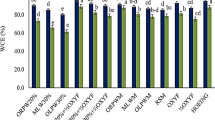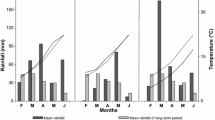Abstract
Nowadays agro-industrial waste induces increasing problems due to the high economic cost and heavy environmental impact of disposal. By contrast, its potential re-use as organic fertilizer could represent a sustainable approach to recycling nutrients and reintegrating organic matter into soil. Such recycling should be particularly beneficial in Mediterranean areas because there is a progressive loss of soil fertility. To assess the possible re-use of industrial citrus waste as organic fertilizer, a two-year research project was carried out to study the effects of dried orange waste on the growth and production of durum wheat (Triticum durum Desf.). Two dried orange waste doses of 4 and 8 kg/m2 were compared with conventional mineral fertilization, of 80 kg/ha2 of nitrogen, and with a control without fertilization in the first year. During the second year, the residual effects of the past year’s fertilization and two-year application of the orange waste doses and mineral fertilization on duration of biological cycle, grain yield, leaf area index, above-ground biomass and crop growth rate were studied. Our results show that organic fertilization gave similar wheat yields to the mineral fertilization, averaging at 3.63 t/ha. Organic fertilization promoted crop growth much more than mineral fertilization, by up to +400%. However, at the highest dose repeated organic fertilization induced a severe depressive effect on crop establishment. It indeed gave the lowest values for leaf area index of 0.6, biomass of 222 g/m2 dry weight and crop growth rate of 2.5 g m−2 d−1 at the heading stage, and a 50% decrease in wheat grain yield. In both years, the lowest dose of orange waste produced maximum agronomic efficiency. We conclude that an appropriate use of dried orange waste as fertilizer can partially solve environmental problems related to the citrus fruit processing industry, and represents a low cost organic matter source for Mediterranean soil with poor fertility.
Similar content being viewed by others
References
Abbate C., Tuttobene R., Avola G., Gennari M. (2008). The effect of citrus pulp amendment on sunflower production and the dissipation of the erbicide aclonifen, Ital. J. Agron. 3, 341–347.
Belligno A., Di Leo M., Marchese M., Tuttobene R. (2005) Effects of “industrial orange wastes” on soil characteristics and on growth and production of durum wheat (Triticum durum Desf.), Agron. Sustain. Dev. 25, 129–135.
Braddock R.J. (1999) Handbook of Citrus By-Products and Processing Technology, John Wiley & Sons, Inc., New York, NY.
Correia Guerrero C., Carrasco de Brito J., Lapa N., Santos Oliveira J.F. (1995) Re-use of industrial orange wastes as organic fertilizers, Bioresource Technol. 53, 43–51.
Fisichella A. (2004) Pastazzo d’agrumi — Residuato dai processi di lavorazione delle industrie di trasformazione — Il trattamento anaerobico, Consulting 6, 18–22.
Gentry T.S., Braddock R.J., Miller W.M., Sims C.A., Gregory J.F. (2001) Volatile organic compounds from citrus feed mill emissions, J. Food Process Eng. 24, 1–15.
Gopinath K.A., Saha S., Mina B.L., Pande H., Kundu S., Gupta H.S. (2008) Influence of organic amendments on growth, yield and quality of wheat and on soil properties during transition to organic production, Nutr. Cycl. Agroecosys. 82, 51–60.
Ingram L.O., Doran J.B. (1995) Conversion of Cellulosic Materials to Ethanol, FEMS Microbiol. Rev. 16, 235–241.
Intrigliolo F., Allegra M., Torrisi B. (2005) Application of organic fertilisers in orange orchard in southern Italy, Geophys. Res. Abstract 7, 286.
MacRae R.J., Hill S.B., Mehuys G.R., Henning J. (1993) Farm-scale agronomic and economic conversion from conventional to sustainable agriculture, Adv. Agron. 43, 155–198.
Mader P., Fliebach A., Dubois D., Gunst L., Fried P., Niggli U. (2002) Soil fertility and biodiversity in organic farming, Science 296, 1694–1697.
Merillot J.M. (1998) Management strategies related to legislature, economics, agronomic and environmental impact of organic wastes, in: Martinez J., Maudet M. (Eds.), Proceedings of the 8th International Conference on Management Strategies for Organic Waste Use in Agriculture, Cemagref, France, May 26–29, pp. 15–24.
Oluremi O.I.A., Ngi J., Andrew I.A. (2007) Phytonutrients in citrus fruit peel meal and nutritional implication for livestock production, Livest. Res. Rural Dev. 19, 89.
Reider C., Herdman W., Drinkwater L.E., Janke R. (2000) Yields and nutrient budgets under composts, raw dairy manure and mineral fertilizer, Compost Sci. Util. 8, 328–339.
Ryan M.H., Derrick J.W., Dann P.R. (2004) Grain mineral concentrations and yield of wheat grown under organic and conventional management, J. Sci. Food Agr. 84, 207–216.
Van Heerden I., Cronjè C., Swart S.H., Kotzè J.M. (2002) Microbial, chemical and physical aspects of citrus waste composting, Bioresource Technol. 81, 71–76.
Wagner J.J., Lusby K.S., Horn G.W. (1983) Condensed molasses solubles, corn steep liquor and fermented ammonia condensed whey as protein sources for beef cattle grazing dormant native range, J. Anim. Sci. 57, 542.
Author information
Authors and Affiliations
Corresponding author
About this article
Cite this article
Tuttobene, R., Avola, G., Gresta, F. et al. Industrial orange waste as organic fertilizer in durum wheat. Agron. Sustain. Dev. 29, 557–563 (2009). https://doi.org/10.1051/agro/2009014
Accepted:
Issue Date:
DOI: https://doi.org/10.1051/agro/2009014




